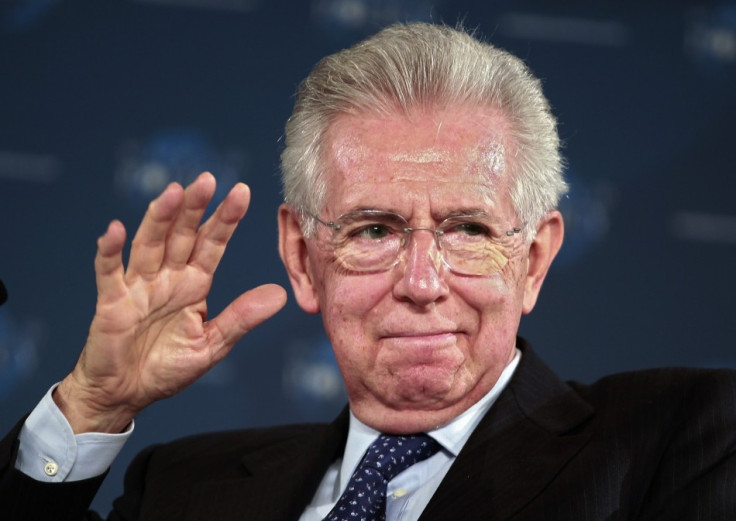Italian Shares Slump, Bond Yields Rise As Monti-Berlusconi Feud Intensifies

Italian shares fell and benchmark bond yields rose Monday as investors begin to assess the risk of the possible resignation of Prime Minister Mario Monti following a key budget debate.
Monti told the Italian media last week that he would hand in an "irrevocable" resignation once the country's Budget Law was passed, citing a withdraw of support from one of his key coalition government partners, Silvio Berlusconi's People of Freedom Party (PDL). The move could trigger fresh political turmoil in Europe's third biggest economy and complicate the European Union's efforts to drive further reform in the banking sector and control the region's ongoing sovereign debt crisis.
"Italy should be very careful not to erode the credibility capital accumulated by PM Monti's government so far," wrote Barclays strategists Fabio Fois and Giuseppe Maraffino. "We believe Monti's commitment to assuming a central role in Italian politics would be the best way to preserve that in the eyes of European partners and financial markets."
Italy's main share index, the FTSE-MIB, fell nearly 3 percent in the opening hour of trading in Milan while benchmark 10-year bond yields rose 39 basis points to 4.84 percent, according to data from the trading platform Trade Web. The difference in yield, or spread, that investors demand to hold Italian debt, known as BTPs, instead of bonds also widened the same amount to 355 basis points - the highest in three months. The single currency hit a two-week low of 1.2913 in the opening hour of London trading.
Credit default swap prices on Italian debt rose 33 basis points to 288 basis points. This means an investor would need to pay an extra €33,000 extra each year for five years to insure €10m in Italian government debt from default.
The Budget Law is set for debate in parliament on 18 December and must, by Italian law, be passed before 31 December. With the votes in place to secure its passage even without the support of Berlusconi's PDL, Monti's resignation is unlikely to have an impact on its content but will likely trigger a dissolution of parliament by President Giorgio Napolitano, setting up early elections in March next year.
The political turmoil in Italy comes just days before European Union leaders are scheduled to meet in Brussels for the final time this year to iron out their differences with respect to plans for a region-wide banking union and deeper fiscal integration among the member states. Monti's support for the German-led drive for austerity and reform has been a lynchpin in the region's ability to control the debt crisis for much of the second half of the year.
A return to front-line politics for former Prime Minister Berlusconi, 76, could drive a wedge between Germany and the rest of southern Europe just as the European Central Bank predicts the region's economy will sink deeper into recession next year.
Figures today are expected to show that its economy shrank at least 0.2 percent in the three months ending in September, extending its fourth recession in the past decade into a second year. The OECD expects a further 2.2 percent contraction next year.
Italy needs to borrow around €410bn ($530m, £330m) in 2013, according to figures from Barclays, down from €470bn this year. Dow Jones has reported a Lloyds research note the suggests Italy's Treausry may postpone a planned €5bn auction of new three-year bonds Thursday if the current market volatility continues. However, an Italian Treasury source told Reuters that the sale will go-ahead as planned.
Standard & Poor's said Monday a key factor in Italy's recovery prospect will be "the uncertainty around whether the next government coalition would remain committed to the structural reform agenda initiated by the current government."
© Copyright IBTimes 2025. All rights reserved.





















